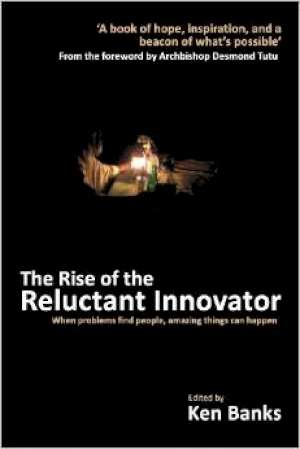16 January 2015
The Rise of the Reluctant Innovator
Ken Banks (ed)
2013, London Publishing Partnership, 212 pages, £12.99
ISBN 9781907994180
Reviewer: Adrian Woods, Eurekazone

Any book with a foreword by Archbishop Desmond Tutu and comments from the World Economic Forum, the BBC, and National Geographic is surely one to take notice of, and this book still exceeded my expectations in so many ways.
If the book has a purpose, it is probably to inspire us to innovate using existing technology for those who cannot help themselves. As an economist in the field of innovation and creativity I was ready to uncover the principles involved. What I didn’t expect was the emotional roller coaster that made me stop and wonder why I was so close to tears. Human stories of injustice and income inequality are so much more powerful than statistics. Politicians and economists please take note. I was moved by the magnanimous response of the human spirit to solve the problems. Surprising as this may sounds, the story here of a patent lawyer was especially moving.
There are 10 stories of ‘reluctant’ innovators. None was forced to innovate but they had the classic necessary combination of motivation, knowledge and ability.
The book was hard to follow sometimes, but much easier if you read about the person and their innovation at the back of the book, before you read their chapter. So many stories in one set of covers made it a little messy too, but also gave so many interesting angles on ‘social’ innovation.
It is an emotional book about the human spirit and the desire help people who cannot help themselves. It is a book about the struggle that innovators face to introduce even low-budget, life-saving innovations. It is a book about the failure of the current economic system to address social needs and how poorer people are locked out from the most basic health care. I got an insight into why childbirth is so dangerous in developing countries; it is more basic than I thought! This is an uplifting and motivating book about the best aspects of human creativity and desire to help those who need it. It is also a book about not clearing your conscience by convincing yourself that Governments and NGO’s are acting on your behalf; their ego and short-sightedness often gets in the way of innovation despite them being good at some things. It is a story of how any of us with the will can creatively apply our knowledge of existing technology in new situations to have outstanding life-saving or life-changing effects for others.
If that is not enough for you, there is a hidden ‘how-to’ manual about social innovation including the qualities you need. This is no technical manual about stage-gating and managing risk, but rather a guide to making something happen against all odds.
It inspired me to make some of our social innovations around economics happen and it’s a long time since that happened to me. I’ll be using some of the examples of creativity, and recommending partners read this book to get them fired-up for innovation.
